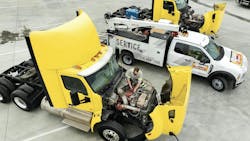Just like no two technicians are the same, no two fleets’ needs are the same. It’s important when hiring a service provider that you define the needs of the fleet based on size, type, and age of the equipment. This includes a discussion of the equipment life cycles. The length of time you plan to keep a trailer has some influence on how much you’ll spend looking after it.
And as Todd Browning, COO, Epika Fleet Services, told Fleet Maintenance, everyone has to be onside with the PM requirements: whether it’s mileage or time-based, what the intervals are, and what service is expected.
“Knowing when the next PM is due is important because consistently performing maintenance at the recommended intervals will help reduce the frequency, magnitude, and cost of repairs, although not eliminate them altogether,” he emphasized.
There’s more to this than just numbers. When you turn over your maintenance work to an outside party, you forfeit some control over the process.
“Fleets need to share in-house practices, goals, such as uptime percentages, and the fleet management philosophy,” Browning advised.
According to Darry Stuart, president and CEO of DWS Fleet Management Services, an independent “Limited Time Executive” transportation and fleet management company, getting your management philosophy across to the service provider is important.
“When fleet managers decide to outsource, they forget they are really just buying labor,” he told Fleet Maintenance. “What changes is those mechanics and technicians may not be managed the same way we manage our own fleets.”
Stuart added that fleets should remember the vendor now decides how money is spent and how repairs are done. “For example, are they going to put a 3M connector in the wiring harness or just take a household wire connector and spin it on to get the light on?” he asked. “Not only have you outsourced the repairs, you have also outsourced the fleet management philosophy.”
About the Author

Jim Park
Jim Park is an award-winning journalist who has covered the trucking industry since 1998. Prior to that, he racked up 2 million miles as a driver and owner-operator pulling tank trailers over-the-road. He continues to maintain his CLD.
Jim's previous driving experience brings a real-world perspective to his work. Jim's strong suits are equipment and technical matters, emerging technology, vehicle spec'ing, safety, and driver issues. He has hosted an overnight radio show for truckers, produced many technical and training videos, and has published three research papers on driver fatigue and the driver shortage. He has earned 9 Jesse H. Neal awards, including “Best Range of Work by a Single Author” in 2020.
